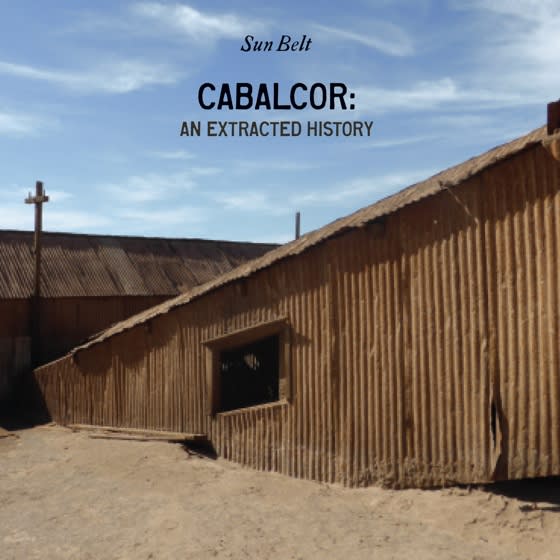Newly formed Vancouver-based group Sun Belt have undertaken an ambitious project with their new album, Cabalcor. The album revolves around the central location of Cabalcor, a dusty tar sands boomtown in an unidentified arid region; each song reflects the area's growth and decline. Having travelled to Tucson, Arizona to record the album, Sun Belt successfully tangle nylon guitars and harmonica with pedal steel and banjo, creating a compelling texture of Latin flavour and country twang that could only be achieved in the Tex-Mex melting pot of the South-western United States.
The fictional landscape is the setting for a collection of surreal tales. The album begins with "Fort Iquique," a track that is, ostensibly, a mysterious crescendo of noise that teleports the listener into the town of Cabalcor. The next offering, "Country of Madmen," lays the groundwork for the stylistic intention of the next 35 minutes. The song acts as a kind of narrative overture for Cabalcor, summarizing the town in a True Detective-esque opening sequence. Opening with ranchera nylon strumming, an omniscient figure speaks of the rugged scene: "Cracked cartilage and bone, man down! Dirt soaks up the blood, as children gather 'round. Later they'll re-enact the scene, dry straw and grenadine."
Cabalcor carves out a plot with different narrative voices and subject matter, but the message remains fairly uniform: Cabalcor is not an easy place to live. "Nobody left in this town, goes outside alone," vocalist Rick Maddocks sings on "Champion the Wonder Horse." Yet, Cabalcor is also presented as pastoral, exemplified by the audible town square vignette with complementary classical guitars over townsfolk chatter on the album's title track.
Sun Belt have done a remarkable job developing a fictional location that has a distinct atmosphere and local character; the album is part of a multi-media release in combination with a book, Cabalcor: An Extracted History, which features fictional sources such as journals, film transcripts, environmental studies and police reports that chart the region's descent into a wasteland. The commendable effort is made all the more impressive by the fact that the album, even without the accompanying book, stands up on its own as a story.
However, while the four interludes play an important role in telling the tale, they occupy a large portion of the album. So while there are many bright spots on the album, the fact that four of ten tracks are interludes means there's less time to fully explore Cabalcor. Still there's more than enough goodness here to keep the album engaging; Paul Rigby's classical guitar contributions, Maddocks' pining voice and the inclusion of bass harmonica (to name a few elements) all successfully mesh to give this album an intriguing sense of time and place.
(Offseason)The fictional landscape is the setting for a collection of surreal tales. The album begins with "Fort Iquique," a track that is, ostensibly, a mysterious crescendo of noise that teleports the listener into the town of Cabalcor. The next offering, "Country of Madmen," lays the groundwork for the stylistic intention of the next 35 minutes. The song acts as a kind of narrative overture for Cabalcor, summarizing the town in a True Detective-esque opening sequence. Opening with ranchera nylon strumming, an omniscient figure speaks of the rugged scene: "Cracked cartilage and bone, man down! Dirt soaks up the blood, as children gather 'round. Later they'll re-enact the scene, dry straw and grenadine."
Cabalcor carves out a plot with different narrative voices and subject matter, but the message remains fairly uniform: Cabalcor is not an easy place to live. "Nobody left in this town, goes outside alone," vocalist Rick Maddocks sings on "Champion the Wonder Horse." Yet, Cabalcor is also presented as pastoral, exemplified by the audible town square vignette with complementary classical guitars over townsfolk chatter on the album's title track.
Sun Belt have done a remarkable job developing a fictional location that has a distinct atmosphere and local character; the album is part of a multi-media release in combination with a book, Cabalcor: An Extracted History, which features fictional sources such as journals, film transcripts, environmental studies and police reports that chart the region's descent into a wasteland. The commendable effort is made all the more impressive by the fact that the album, even without the accompanying book, stands up on its own as a story.
However, while the four interludes play an important role in telling the tale, they occupy a large portion of the album. So while there are many bright spots on the album, the fact that four of ten tracks are interludes means there's less time to fully explore Cabalcor. Still there's more than enough goodness here to keep the album engaging; Paul Rigby's classical guitar contributions, Maddocks' pining voice and the inclusion of bass harmonica (to name a few elements) all successfully mesh to give this album an intriguing sense of time and place.
